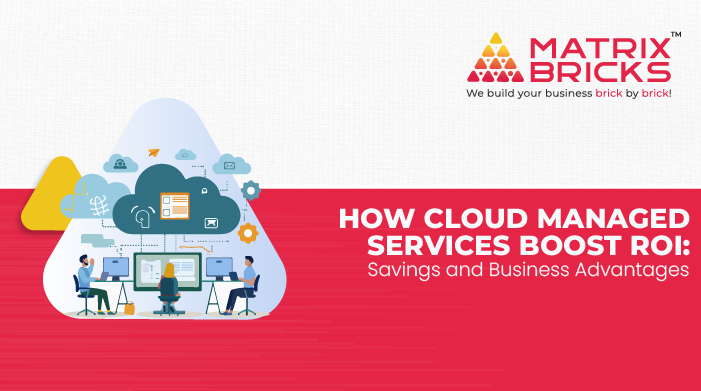
As businesses increasingly shift to digital platforms, cloud managed services have become a critical solution for optimising operations and reducing costs. By leveraging these services, companies can enhance their overall efficiency while minimising expenses. The return on investment (ROI) for adopting cloud managed services is substantial, with benefits ranging from cost savings to improved business continuity and security.

1. Understanding Cloud Managed Services
Outsourcing regular IT management for cloud-based services and technical assistance to improve corporate operations is referred to as cloud managed services. These services are delivered by third-party experts who specialise in the management of cloud infrastructure and applications, allowing businesses to focus on their core competencies without the burden of managing complex IT environments.
Components of Cloud Managed Services:
- Infrastructure Management:
Ensures optimal performance and uptime for cloud-based servers, storage, and networks.
- Security and Compliance:
Protects cloud infrastructure from threats and ensures compliance with industry standards.
- Data Backup and Recovery:
Provides consistent backups and dependable choices for data recovery in case of data loss.
- Application Management:
Optimises cloud-based applications to ensure they deliver maximum value and performance.
2. Cost Savings with Cloud Managed Services
The possibility for large cost reductions is one of the strongest arguments in favour of cloud managed services for enterprises. Traditional IT administration frequently entails significant expenditures for the upkeep of gear, software, and specialised staff. Conversely, partnering with cloud managed service providers can reduce these costs by offering a more scalable and efficient solution.
Key Ways to Achieve Cost Savings:
- Lower Capital Expenditure (CapEx):
By outsourcing IT infrastructure management, businesses avoid the hefty costs of purchasing and maintaining hardware.
- Reduced Operational Expenditure (OpEx):
These services typically come with predictable monthly costs, making it easier for businesses to manage budgets and avoid unexpected expenses.
- Minimised Downtime:
Expert monitoring and management help minimise downtime, which can be extremely costly for businesses.
- Optimised Resources:
Free up internal teams to focus on strategic initiatives, rather than routine IT maintenance tasks.
3. Business Benefits of Cloud Managed Services
Cloud managed services offer several business advantages in addition to cost savings. These advantages range from enhanced security to greater scalability and flexibility, all of which contribute to a positive ROI and help businesses achieve their strategic goals.
Top Benefits of Cloud Managed Services:
- Enhanced Security:
Managed services providers implement advanced security measures, such as regular updates, monitoring, and threat detection, which can be costly for businesses to maintain in-house.
- Flexibility and Scalability:
You may simply adjust the amount of IT resources you use in accordance with your business’s demands, so you only pay for what you need.
- Access to Expertise:
Gain access to specialised knowledge and resources that may not be available internally.
- Focus on Core Business Activities:
By outsourcing IT management, businesses can dedicate more time and resources to their core activities, driving innovation and growth.
4. How Cloud Managed Service Providers Enhance Performance

The benefits of cloud managed services are numerous and can directly enhance business performance. They bring expertise, cutting-edge technology, and a proactive approach to managing cloud environments, all of which contribute to better outcomes for businesses.
Ways Providers Enhance Business Performance:
- Increased Efficiency:
Providers use advanced tools and automation to ensure optimal performance and quickly address any issues that arise.
- Access to Latest Technologies:
Stay ahead of the curve by leveraging the latest cloud technologies and updates.
- Improved Collaboration:
Facilitate seamless collaboration with secure, reliable access to data and applications from any location.
- Faster Time to Market:
With efficient cloud management, businesses can bring products and services to market more quickly.
5. Measuring the ROI of Cloud Managed Services
Businesses must assess both direct and indirect advantages to calculate the ROI. Direct benefits typically include cost savings, while indirect benefits may involve improved security, scalability, and overall business performance.
Factors for Measuring ROI:
- Cost Reductions:
Assess reductions in both capital and operational expenditures.
- Improved Productivity:
Evaluate time saved and productivity gains from reduced IT management burdens.
- Enhanced Security and Compliance:
Consider the cost savings from minimising risks of data breaches and compliance violations.
- Revenue Growth:
Measure the impact of enhanced business performance on revenue growth, such as faster product launches and improved customer satisfaction.
6. Benefits of Cloud-Managed Services in Different Industries
Cloud-managed services offer sector-specific benefits that help industries achieve their unique goals. For example, a healthcare organisation might focus on data security and compliance, while a retail business may prioritise scalability and customer engagement.
Key Benefits of Cloud-Managed Services by Sector:
- Healthcare:
Enhanced data security and compliance with regulations, such as HIPAA.
- Retail:
Improved scalability for seasonal demand fluctuations and better customer engagement through cloud-based platforms.
- Finance:
Stronger security measures to protect sensitive financial data and ensure regulatory compliance.
7. Choosing the Right Cloud Managed Service Provider
Optimising the advantages and return on investment of cloud managed services requires careful selection of cloud managed service providers. Businesses should evaluate potential providers based on experience, service offerings, and alignment with their specific needs.
Criteria for Selecting a Provider:
- Experience and Track Record:
Look for providers with a strong track record in managing cloud services for businesses in your industry.
- Comprehensive Offerings:
Choose a provider that offers a full range of services, from infrastructure management to security and compliance.
- Service Level Agreements (SLAs):
Ensure that the provider offers robust SLAs that guarantee performance, response times, and uptime.
- Customisation and Flexibility:
The provider should be able to tailor services to meet your business’s unique needs and scale as required.
Conclusion:
In summary, adopting cloud managed services provides significant cost savings and numerous business benefits that contribute to a positive ROI. By reducing costs, enhancing security, and improving operational efficiency, these services allow businesses to focus on their core competencies and strategic growth objectives.
To maximise ROI, businesses must carefully select their cloud managed service providers based on factors such as experience, expertise, and service offerings. Ultimately, embracing these services is about more than just reducing costs; it’s about driving innovation, growth, and competitive advantage in an ever-evolving digital landscape.
Final Thoughts:
- These services provide cost savings and enhance overall business performance.
- Select a company who offers a wide range of services and has a track record of success.
- Regularly assess the impact of these services on your business to ensure they align with your strategic goals.
- By partnering with the right provider and leveraging the full range of cloud-managed services, businesses can unlock new opportunities for growth, innovation, and long-term success.





